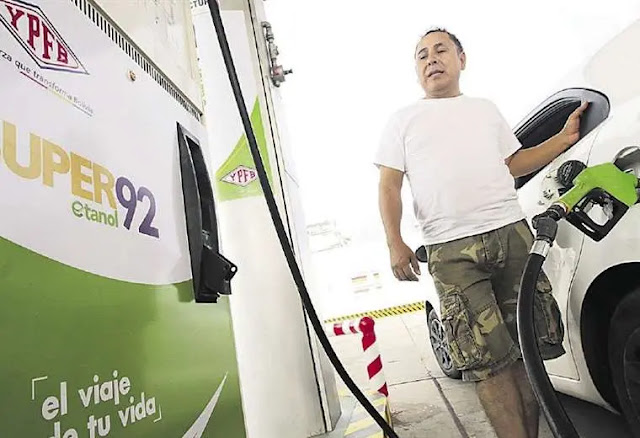On March 14, the Executive Branch approved Supreme Decree 5135 to gradually replace the importation of inputs, additives, and diesel oil, through blends of biodiesel and anhydrous alcohol with fossil-based fuels up to 25%. The measure will not be implemented immediately, at least not until 2024.
During an interview with the program ¡Qué Semana! on EL DEBER Radio yesterday, the president of YPFB, Armin Dorgathen, announced that the implementation of the measure will have to await the results of independent studies to be carried out by universities, in coordination with vehicle brands and importers.
"I don't estimate that this year we will even reach blending 25% (of alcohol) into gasoline. It will increase based on how gasoline reacts in each of the different regions of the country and the studies being conducted," the executive said.
The announcement of the 25% increase in alcohol in gasoline caused various reactions throughout the country, especially among owners of new vehicles, who mentioned that the purchase warranty could be voided by loading ethanol above the manufacturer's allowed limit. In other sectors, such as transporters, the measure was labeled as a "disguised gasoline price hike."
"It's not about raising it to 25% tomorrow, first we have to regulate, we have to have studies to make this decision. So, what we are going to do is, with institutions external to YPFB, conduct studies to see how much ethanol can be raised in gasoline," Dorgathen explained, using countries like Paraguay as an example, where gasolines contain up to 27% ethanol content, and its vehicle fleet is similar to Bolivia's.
Decree 5135 includes a transitional provision establishing a period of sixty (60) calendar days for the Ministry of Hydrocarbons and Energy to regulate the quality, safety, transportation, storage, and pricing methodology for the commercialization of fossil-based fuels, diesel oil, and gasoline that will be blended with plant-based additives.
Subsequently, the National Hydrocarbons Agency (ANH) will be responsible for determining the technical, economic, and regulatory specifications for blending these additives within thirty (30) calendar days after the issuance of the corresponding regulations.
Types of Gasoline
Dorgathen explained that currently, the national fuel market offers three types of gasoline: Special (85 octane), 'Ethanol' (92 octane), and Premium (95 octane). He clarified that for the implementation of the latter, a regulatory change had to be made to allow the importation of high-octane gasolines through new import points. He also noted that the new Premium gasoline is of higher quality than the previous one and has already captured 7% of gasoline consumers' preferences.

